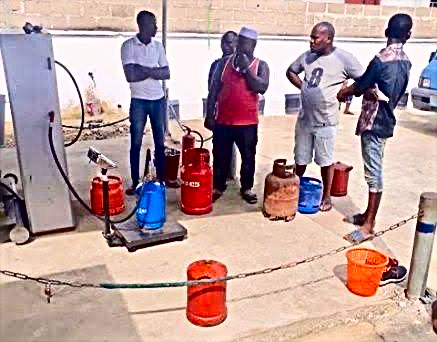In the latest report released by the National Bureau of Statistics (NBS) in Abuja, the price of Liquefied Petroleum Gas (LPG), commonly referred to as cooking gas, has witnessed a notable increase, affecting households across Nigeria. The average retail price for refilling a 5kg cylinder of LPG rose by 3.55% from December 2023 to January 2024, marking a significant monthly increase from N4,962.87 to N5,139.25. This change reflects a broader trend of rising energy costs in the country, with a year-on-year comparison showing a 12.00% increase from N4,588.75 in January 2023.
The NBS report provides a detailed state profile analysis, revealing disparities in gas prices across different regions. Nasarawa State topped the list with the highest average price for a 5kg LPG refill at N5,790.00, closely followed by Jigawa and Gombe states, with prices at N5,681.82 and N5,660.00, respectively. Conversely, Kaduna State reported the lowest average price at N4,150.00, with Ogun and Osun states trailing at N4,751.04 and N4,763.53, respectively. These variations highlight the economic and logistical challenges faced by Nigerian states in accessing affordable cooking gas.
Moreover, the report’s analysis by geopolitical zones indicated that the North-East region experienced the highest average retail price for a 5kg LPG cylinder at N5,296.32, followed by the North-Central zone at N5,240.36. The South-West zone, on the other hand, recorded the lowest average price at N4,805.05. This zonal pricing disparity underscores the impact of regional factors such as transportation costs, supply chain constraints, and demand patterns on gas prices.
The situation is similar when examining the prices for larger 12.5kg LPG cylinders, which also saw an increase. From December 2023 to January 2024, the average retail price for refilling a 12.5kg cylinder rose by 1.96% from N11,510.16 to N11,735.72. This represents a 14.19% increase on a year-on-year basis from N10,277.17 in January 2023. The state profile analysis for the 12.5kg cylinder refills revealed that Cross River State had the highest average retail price at N13,040.00, with Jigawa and Zamfara following at N12,875.00 and N12,725.00, respectively. In contrast, the lowest prices were found in Kaduna, Kwara, and Niger states, at N9,699.50, N10,000.00, and N10,400.00, respectively.
Geopolitical zone analysis further highlighted the South-South as having the highest average retail price for a 12.5kg cylinder refill at N12,602.47, with the North-West and South-West zones following at N12,224.93 and N11,189.02, respectively. These figures not only illuminate the regional disparities in gas prices but also signal the broader economic pressures faced by Nigerian consumers amidst rising energy costs.
The increase in LPG prices poses significant implications for Nigerian households, many of which rely on cooking gas as a primary energy source. Higher gas prices can strain household budgets, particularly for low and middle-income families, and potentially lead to increased use of alternative fuels like kerosene, charcoal, or firewood, which have environmental and health implications. The report’s findings call for a concerted effort from policymakers, industry stakeholders, and the government to address the factors driving up LPG prices and to explore measures to stabilize and make cooking gas more affordable for Nigerians.
In light of these developments, the government and relevant stakeholders are urged to investigate the underlying causes of the price increases, including supply chain disruptions, foreign exchange fluctuations, and infrastructural challenges. Implementing policies to enhance domestic gas production, improve distribution infrastructure, and promote gas market competition could help mitigate price increases and ensure that LPG remains accessible and affordable for all Nigerians. Additionally, targeted subsidies or tax incentives for LPG could be explored as immediate measures to alleviate the financial burden on consumers, particularly the most vulnerable households.
The rising prices of LPG underscore the broader challenges facing Nigeria’s energy sector and highlight the need for strategic interventions to ensure energy affordability and security. As the country continues to navigate economic uncertainties, the findings of the NBS report serve as a crucial indicator of the immediate and long-term policy actions needed to support Nigerian households and promote sustainable energy use.



